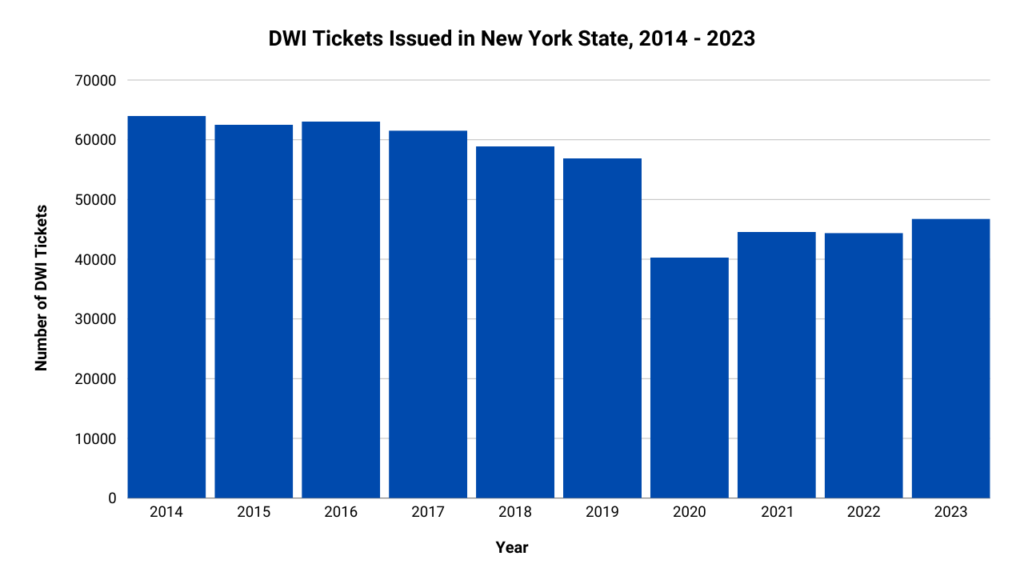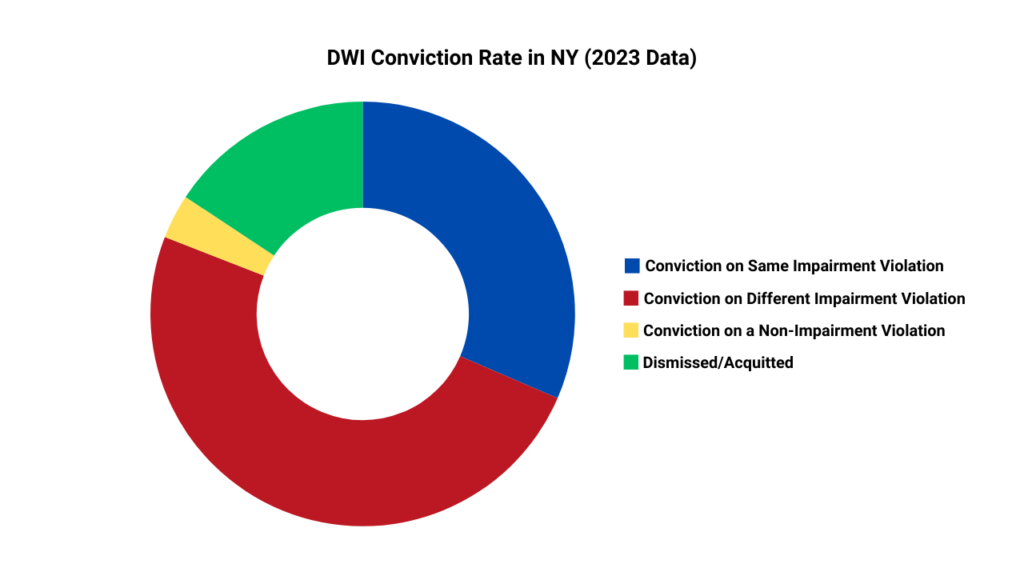It goes without saying that alcohol-related driving offenses like DUI/DWI are some of the most serious traffic crimes a driver can be charged with. Navigating through the complicated terrain of DUI/DWI law can be quite complex. Many times, drivers do not even know if there is a difference between DUI and DWI, let alone the various penalties they can incur if they are convicted of drunk driving in NY.
New York drivers who are convicted of a DWI offense while in another state can have their license suspended for no less than 90 days. This in addition to any penalties that apply in the state in question. Additionally, it is also important to understand the implications of a New York DWI for out-of-state drivers.
The following information has been designed to clarify all of this and to help drivers better understand the various charges they may be facing.
See first time DWI offenses in NY
What Are the Penalties for a DWI/DUI Conviction in New York?
Jail Time: Drivers who are convicted of DWI in New York face a jail sentence of up to one year. A second conviction within 10 years increases the maximum sentence to four years, and a third in 10 years can carry a sentence of up to seven years.
Suspension or revocation: New York can suspend or revoke the license of any driver convicted of DWI for up to one year. A revocation is worse than a suspension in that, when the revocation period ends, the license cannot simply be reinstated; the driver must reapply for a new license, including the written exam and road test.
Fines: A DWI conviction in New York carries a fine of $300 to $2,500, depending on one’s BAC. A second DWI conviction within 10 years can mean a fine of up to $5,000. A third conviction in 10 years can result in a fine of up to $10,000.
Surcharges: On top of the fine, drivers will be expected to pay a mandatory state surcharge of $260 to $400.
DWI - First Offense
| BAC | Fine | Surcharge | Jail Time | Suspension/Revocation |
|---|---|---|---|---|
| 0.02 to 0.07 | $300 to $500 | $260 to $400 | Up to 15 days | Suspension for 90 days |
| 0.08 to 0.017 | $500 to $1,000 | $260 to $400 | Up to 1 year | Revocation for 6 months |
| 0.018 or more | $1,000 to $2,500 | $260 to $400 | Up to 1 year | Revocation for 1 year |
DWI - Second Offense
| BAC | Fine | Surcharge | Jail Time | Suspension/Revocation |
|---|---|---|---|---|
| 0.02 to 0.07 | $500 to $750 | $260 to $400 | Up to 30 days | Revocation for 6 months |
| 0.08 to 0.017 | $1,000 to $5,000 | $260 to $400 | Up to 4 years | Revocation for 1 year |
| 0.018 or more | $1,000 to $5,000 | $260 to $400 | Up to 4 years | Revocation for 18 months |
DWI - Third Offense
| BAC | Fine | Surcharge | Jail Time | Suspension/Revocation |
|---|---|---|---|---|
| 0.02 to 0.07 | $750 to $1,500 | $260 to $400 | Up to 180 days | Revocation for 6 months |
| 0.08 to 0.017 | $2,000 to $10,000 | $260 to $400 | Up to 7 years | Revocation for 1 year |
| 0.018 or more | $2,000 to $10,000 | $260 to $400 | Up to 7 years | Revocation for 18 months |
Auto insurance premium increases: Car insurance providers in New York take convictions for DWI very seriously, and can raise rates dramatically. Some studies estimate an average increase in premiums of 76%. These increased rates can last for 10 years or more! A person could even be dropped from their insurer altogether.
Criminal record: DWI is more than a traffic violation; it’s a criminal offense and a conviction means having a permanent criminal record. This can affect many aspect of one’s life, from employment to housing.
Other penalties: In addition to these, a person convicted of DWI in NY can be required by the judge to install an ignition interlock device on their car. In some cases, ao person can also be asked to attend a victim impact program.
See The Consequences of Driving While Intoxicated (DWI) in New York
Notice: The penalties for drunk driving are different if the driver is under the age of 21.

Need help with your New York DWI/DUI?
Call Now - We've Fought Over 50,000 Traffic Ticket Cases
Quick, free, and no obligation.
What is a DWI/DUI in New York?
Depending on the state, driving under the influence of alcohol or drugs the offense may be labeled DUI (driving under the influence) or DWI (driving while intoxicated). Some states consider these two entirely separate offenses. However, in New York the terms DUI and DWI are used interchangeably for the same offense. The proper label for the offense is DWI (driving while intoxicated).
If a person consumes alcohol prior to driving, it is quite likely that their blood alcohol content (BAC) might be over the legal limit. Contrary to popular belief, even if a person is not drunk, only had one beer, and feels totally fine, their BAC could be much higher than one would suspect.
In New York, driving with a BAC of 0.02% to 0.07% can result in a charge of driving while ability impaired (VTL 1192-1). This is slightly different than a DWI, and carries slightly lesser penalties.
Driving with a BAC of 0.08% or higher can mean being charged with driving while intoxicated (VTL 1192-2). Driving while intoxicated in New York is a very serious crime.
Those with a BAC level of 0.18% or higher can be charged with aggravated driving while intoxicated (VTL 1192-2a), which is the most serious DWI charge.
While it is common for police to conduct a breathalyzer or other chemical test to determine one’s BAC before charging a driver with DWI, it is not required. If the officer perceives that a person is showing signs of being intoxicated, he/she can be charged with violating common law DWI/DUI (VTL 1192-3). This offense is practically the same as regular DWI (VTL 1192-2) except, the BAC level is essentially irrelevant. As long as the officer bases his observation on his experience, training, and blatantly visible signs (e.g. slurred speech, odor of alcohol, bloodshot eyes, etc.), this will give rise to probable cause to charge and arrest someone for drunk driving.
A conviction for common law DWI/DUI (VTL 1192-3) carries with it the same penalties as regular DWI (VTL 1192-2).
Regardless of which offense you are convicted of, you might be required to install an ignition interlock device that would not allow your car to turn on until you blew into it and registered a BAC within the legal limit. (Imagine having to do this every time you wanted to use your car.)
Important: An officer must have “probable cause” to believe a driver is intoxicated before gathering any evidence.
Common Legal Defenses to DWI in New York
Depending on what charge a person faces, there are several good defenses an experienced DUI/DWI attorney can make to help get a reduction or dismissal.
Did you
know?


Kent Ng
When it comes to DWI in New York (VTL 1192-2), it can often be argued that the breathalyzer was not calibrated or administered properly. There are strict protocols (including observation for things like belching) that police are supposed to follow. If it is revealed that those protocols were not followed, it can lead to the test being thrown out. If the test is the only evidence of DWI, that in itself can lead to a dismissal of the charges. In addition, if the results of the test were extremely close to the legal limit (e.g. the breathalyzer registers a .087), an attorney could try to dispute the findings of the test.
In most cases, it is much more fruitful to argue that the evidence being used against the driver was illegally obtained, and, consequently, must be excluded from evidence. This type of defense usually relies on a motion to suppress the results of the breathalyzer, any incriminating statements made to the officer, and all other tangible evidence (e.g. bottles, cans, etc.) found in the vehicle.
This defense is predicated on the fact that an officer must have probable cause to stop and search a vehicle. If it can be established that the officer lacked probable cause, any and all evidence will be considered inadmissible because they were obtained unlawfully. Likewise, if an officer coerced or forced a confession there could be grounds for excluding the confession due to a violation of one’s Fifth Amendment right. However, it is worth mentioning two things that drivers are usually unaware of. First, like it or not, the Supreme Court of the United States has consistently concluded that the warrant requirement does not apply to an automobile. This means an officer does not need a warrant to stop or search a car, just probable cause. Second, once an officer has probable cause to lawfully search a vehicle, he has the legal authority to seize any illicit item legally found, whether the officer was originally looking for it or not.
The good news is that, even if the evidence cannot be excluded, a skilled attorney will be able to rebut the allegation of the police officer being called to testify against the driver. For instance, if the officer says that the driver failed several field sobriety tests, the attorney can provide evidence that this was because his directions were utterly confusing and poorly explained. Similarly, if one’s eyes were bloodshot, an attorney can introduce evidence that shows this was due to a lack of sleep, allergies, new contact lenses that were irritating, or any other valid reason for why eyes might be red.
Case Law Analysis
New York case law reveals that clever defense attorneys have tried a whole host of defenses to get their client’s DUI/DWI charges dismissed. One attorney tried to obliterate a section of the drunk driving statute completely.
In People v. Cruz, 48 NY 2d 419, the defendant’s attorney argued that the phrases “intoxicated condition” and “impaired” were unconstitutionally vague and unenforceable. He argued that the statute did not explain how impaired a person needed to be or to what extent. However, the court disagreed and, in doing so, redefined DUI/DWI law in New York in a whole new way.
The court concluded:
“In sum the prohibition against driving while the ability to do so is impaired by alcohol … is not a vague and indefinite concept as the defendant contends. It is evident from the statutory language and scheme that the question in each case is whether, by voluntarily consuming alcohol, this particular defendant has actually impaired, to any extent, the physical and mental abilities which he is expected to possess in order to operate a vehicle as a reasonable and prudent driver.” (See People v. Cruz, 48 NY 2d 419)
This ruling set the foundation for what needs to be proven in any DWI/DUI case. First and foremost, any impairment whatsoever of the abilities that you are expected to have as a reasonable and prudent driver due to consuming alcohol will be enough to convict you of driving while intoxicated in New York.
Second, even though the statute does not have exact or precise cut-offs for what amounts to being “impaired,” it nonetheless is valid. In many ways, this provides a police officer with tremendous discretion to determine what gives rise to being impaired.
In People v. Kowalski, 291 AD 2d 669, the court determined what amounts to probable cause. The court ruled:
“When a defendant is charged with driving while intoxicated, probable cause for the arrest exists if the arresting officer can demonstrate reasonable grounds to believe that the defendant had been driving in violation of Vehicle and Traffic Law § 1192.”
However, this leaves one wondering: what constitutes “reasonable grounds?”
Ultimately, probable cause consists of having a “fair probability” based on the “totality of the circumstances” that you were driving while under the influence. (See Illinois v. Gates, 462 U.S. 213.) This too reveals that police are given a wide-range of discretion when evaluating whether they can stop your vehicle, search it, and arrest someone.
Key Takeaways
- A person does not have to “feel drunk” to be charged with DWI in New York.
- An officer does not have to perform a breathalyzer or other field sobriety tests to determine that a driver is intoxicated.
- The more intoxicated a person is, the greater the penalties for a DWI conviction.
Common Questions About DWI in New York
- How long does a DWI/DUI stay on my driving record?
Alcohol or drug-related offenses stay on one’s New York driving record for 10 years.
- Can you get a DWI expunged in New York?
New York does not allow criminal records to be expunged. In limited circumstances, a person can have their record sealed. In most cases, a DWI is eligible for sealing, provided the driver meets all the other necessary criteria.
- Is a drunk driving a felony in NY?
In most cases, a DWI is charged as a misdemeanor. However, a charge of aggravated DWI (1192-2a) can be charged as a felony. In addition, a second or third DWI charge within 10 years can also be charged as a felony.
- What are the penalties for a minor caught driving while intoxicated in New York?
Drivers under the age of 21 who are accused of drunk driving can be charged under New York State’s Zero Tolerance law. The penalties for this are different from regular DWI. A conviction means paying a $125 civil penalty and suffering a six-month license suspension.
- What happens if I refuse a breathalyzer or other chemical test?
Refusing to submit to a breathalyzer when asked by a police officer can have its own serious consequences, regardless of whether the driver is ultimately convicted of any DWI charges. This includes a $500 civil penalty and a license revocation of no less than one year. Read more
DWI Data in New York
In 2023, police throughout New York State issued a total of 46,782 tickets for Driving While Intoxicated (DWI) violations according to the Institute for Traffic Safety Management & Research. This is 5% higher than the number of DWI tickets in 2021 (44,566 tickets) and 2022 (44,391 tickets). Tickets for driving under the influence of drugs or alcohol have been gradually declining over the years until after the pandemic. As more people returned to in-person work and activities, traffic volume increased again, leading to a higher chance of DWI offenses being detected as more people were back on the road.

Nassau County saw the most drunk driving tickets of any country in 2023 with 4,516 tickets in total. It is followed by Westchester (3,492 tickets), Suffolk (3,247 tickets), and Erie (2,976 tickets). All four counties saw slightly higher citations than in the previous year.
The conviction rate for DWI in New York was quite high for 2023: 84.3% of all DWI charges were convicted on the same, different, and non-impairment violations. Only 15.7% of all DWI tickets that year were dismissed and acquitted. For more details about drunk driving tickets and accidents in New York State, see our data page.



